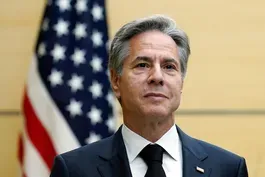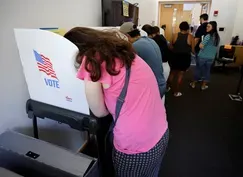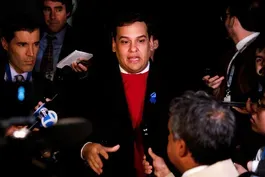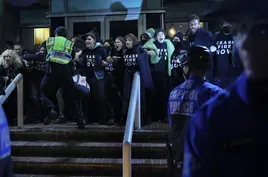
Israel drops evacuation leaflets in southern Gaza
Clip: 11/16/2023 | 7m 51sVideo has Closed Captions
Israel drops evacuation leaflets in southern Gaza, signaling expansion of invasion
Communications with Gaza are mostly cut off because of a lack of fuel to power the system there. Israel is pressing its invasion in the north, and the IDF discovered the body of one of the 240 hostages held by Hamas. Her remains were found near Al Shifa hospital, the main medical center in northern Gaza. Leila Molana-Allen reports.
Problems with Closed Captions? Closed Captioning Feedback
Problems with Closed Captions? Closed Captioning Feedback
Major corporate funding for the PBS News Hour is provided by BDO, BNSF, Consumer Cellular, American Cruise Lines, and Raymond James. Funding for the PBS NewsHour Weekend is provided by...

Israel drops evacuation leaflets in southern Gaza
Clip: 11/16/2023 | 7m 51sVideo has Closed Captions
Communications with Gaza are mostly cut off because of a lack of fuel to power the system there. Israel is pressing its invasion in the north, and the IDF discovered the body of one of the 240 hostages held by Hamas. Her remains were found near Al Shifa hospital, the main medical center in northern Gaza. Leila Molana-Allen reports.
Problems with Closed Captions? Closed Captioning Feedback
How to Watch PBS News Hour
PBS News Hour is available to stream on pbs.org and the free PBS App, available on iPhone, Apple TV, Android TV, Android smartphones, Amazon Fire TV, Amazon Fire Tablet, Roku, Samsung Smart TV, and Vizio.
Providing Support for PBS.org
Learn Moreabout PBS online sponsorshipAMNA NAWAZ: Welcome to the "NewsHour."
Communications with Gaza are mostly cut off tonight because of a lack of fuel to power the system there.
Israel is pressing its invasion in the north, and, today, the Israel Defense Forces discovered the body of one of the 240 hostages held by Hamas.
Her remains were found near Al Shifa Hospital, the main medical center in Northern Gaza.
Parts of it are now controlled by the IDF.
Leila Molana-Allen reports.
LEILA MOLANA-ALLEN: In Southern Gaza, thousands of Palestinians crowd tent cities after fleeing their homes in the north.
Now they fear they will have to leave again.
WOMAN (through translator): Today, in their leaflets, they are telling us to evacuate the south.
LEILA MOLANA-ALLEN: Early today, the IDF dropped leaflets over the southern city of Khan Yunis, warning residents to get out.
But many, like the Abu Jabal family, don't know where to go.
ATYA ABU JABAL, Displaced From Gaza City (through translator): They asked us, the citizens of Gaza, to go to the south.
We went to the south.
Now they are asking us to leave.
Where do we go?
We want to understand where exactly we should go.
LEILA MOLANA-ALLEN: In Northern Gaza, IDF forces stormed Al Shifa Hospital for the second day, searching for signs of Hamas.
MAN: We found a vehicle filled with ammunition.
LEILA MOLANA-ALLEN: Today, the IDF released another video of weapons they say were found in a car in the hospital compound and this video of what they claim is the entrance to a tunnel in the hospital complex, but have not shown evidence of their claim that Hamas runs a command center underneath Al Shifa.
Gaza's Hamas-run Health Ministry denies the claims and alleges IDF forces have shelled hospital rooms.
Doctors inside the hospital say lifesaving medical devices have been destroyed.
DR. NATALIE THURTLE, Doctors Without Borders: MSF is deeply shocked by what's happened at Shifa, the raid, with no guarantee of protection of civilians and medical staff and patients inside that hospital complex.
LEILA MOLANA-ALLEN: Dr. Natalie Thurtle is the deputy medical coordinator for international NGO Doctors Without Borders in Jerusalem.
MSF also denies Israel's claims of a Hamas command center.
DR. NATALIE THURTLE: We have worked in Shifa for many years.
We've never seen anything that has indicated that that is the case.
And regardless of the perception that that may be the case, it doesn't absolve anybody of the responsibility to protect civilians and patients and medical staff.
LEILA MOLANA-ALLEN: With the power cut off, dozens of premature babies don't have working incubators.
Six have reportedly died.
Hundreds of patients and thousands of displaced civilians remain trapped inside the hospital grounds, under siege for a week now.
MSF also has over 100 staff and their family members taking shelter in the vicinity.
DR. NATALIE THURTLE: They have run out of food and water, and we have got children here who are really quite sick.
Every time that we have tried to evacuate them, despite assurances that there is a safe path to the south, they have been faced with drones firing outside the door, crossfire and shelling ongoing.
And so they haven't been able to move.
LEILA MOLANA-ALLEN: There is no end in sight to Israel's invasion, which it says will eventually expand south.
With no fuel, Gaza's phone and Internet lines are dark again today.
Voiceless, Gazans bury their endless stream of dead and pray, with little hope left, for those still living.
For the "PBS NewsHour," I'm Leila Molana-Allen.
AMNA NAWAZ: And Leila joins me now here in the studio.
Leila, it is so good to say, good to see you in person.
LEILA MOLANA-ALLEN: Good to see you, Amna.
AMNA NAWAZ: So you have been covering this war every day since it began, nearly six weeks in now.
Just pull back the curtain a little bit.
Tell us about what that's been like, the experience of reporting on this as a journalist.
LEILA MOLANA-ALLEN: I mean, the first thing to say is, war is horrific anywhere.
And I have covered many conflicts over the last 15 years.
But this one is in such a small space.
So, to begin with, the number of people killed on October the 7th in the Hamas attacks, everybody in this country of just 10 million people knows someone, and then, of course, such an incredibly small land mass inside Gaza as well in a place the size of Rhode Island.
You have got nearly 2.5 million civilians living there.
Now, there's also the incredibly particular difficulty of access with this war.
So we were based in Israel.
We were going across Israel, across the Palestinian territories, but not inside Gaza.
Normally, it is closed, whenever there's a war every couple of years, as there always is in Gaza, and then journalists can go in.
But it's now been six weeks, and there's no sign we will be able to properly go in any time soon.
When we have been able to enter, it's with the Israel Defense Force, and, of course, they control what we are able to see.
We cannot speak to Gazans in that situation, no matter how close we are to them.
We can only see what we're able to see with the army.
And, of course, our colleagues who are covering Gaza are Palestinian journalists themselves; 37 have died already in six weeks, most deadly period for journalists since the Committee to Protect Journalists began.
They're giving their lives to show us what's happening.
AMNA NAWAZ: You have heard now, after more than five-and-a-half weeks of this war, President Biden is now saying the only way out of this will be a two-state solution.
What do you see?
Do you see any room for that happening?
LEILA MOLANA-ALLEN: This has been the idea now for years, but there's been no movement on the peace process at all since the end of the Second Intifada around 2005, 2007.
That was the last time we were really seeing conversations.
The first question is, where would it be?
The land mass that's available to Palestinians now is the West Bank, and that - - we have this huge issue with settlers, who are increasingly becoming violent against Palestinian villagers there.
I was there seeing hundreds of people being forcibly displaced from their land by violence, sometimes by actually being killed, 700,000 settlers there who are building on land where they're not supposed to build, supported increasingly by the government and the Israeli army, which many international NGOs say is a war crime if the government's actually sponsoring it.
Then, of course, you have got Gaza, which would theoretically be at least the economic capital of a state, because everyone there is the most highly educated.
It is the wealthiest part, in terms of it's access to a port if it wasn't under siege.
Gaza's gone.
Half of the housing units there are gone.
It's been completely leveled.
So where actually would this even take place?
AMNA NAWAZ: From the beginning of this war, there has been this concern it could broaden, it could spread in the region.
You have reported from across the region for years.
Is that concern still there?
LEILA MOLANA-ALLEN: That concern is still there, but much less than it was at the beginning.
It's become clear that, firstly, Iran has stepped forward and said, listen, to Hamas officials, we did not know this attack was going to happen.
You didn't let us know.
We didn't do it in coordination.
So, while they have been sponsoring Hamas, it's not the same as a fully staged attack.
The same with Hezbollah in Lebanon.
It's become clear that, while they are launching strikes, they are not escalating that to a full-scale war.
And they have their own interests to defend, which is, they are in a powerful political position in Lebanon, and they don't want to be seen as complicit in getting a lot of Lebanese people killed.
So, at the moment, those parties don't seem to be getting involved.
What's more of a question here is, what happens to Palestinians?
We are seeing scenes that remind everybody of the Nakba, the Catastrophe, what Palestinians and the Arab world call 1948, when Palestinians were forcibly moved from their land and never allowed to come back, these queues of people were seeing moving into South Gaza.
The IDF is saying they are going to spread that invasion into South Gaza.
So then where do people go?
Either they're trapped in a kill box or there is a humanitarian corridor into Egypt.
Will they ever be allowed to come back?
One-and-a-half-million Palestinian refugees already living across the region.
How many more?
Will this be another case of them losing their land for good?
AMNA NAWAZ: We know you're going to be back out there reporting for us very soon.
But, in the meantime, Leila Molana-Allen, it is great to have you here in studio with us.
Thank you.
LEILA MOLANA-ALLEN: Thank you, Amna.
Blinken discusses relations with China, support of Israel
Video has Closed Captions
Clip: 11/16/2023 | 7m 20s | Blinken discusses improving relations with China, support of Israel amid ceasefire calls (7m 20s)
Brian Stelter on 'Network of Lies' and Fox's brand
Video has Closed Captions
Clip: 11/16/2023 | 6m 3s | Brian Stelter discusses 'Network of Lies' and how Fox maintains its brand (6m 3s)
Election workers face violent threat and harassment
Video has Closed Captions
Clip: 11/16/2023 | 6m 53s | Election workers face violent threats and harassment amid dangerous political rhetoric (6m 53s)
Elle and Keegan-Michael Key trace sketch comedy's history
Video has Closed Captions
Clip: 11/16/2023 | 7m 15s | Elle and Keegan-Michael Key chronicle 'The History of Sketch Comedy' in new book (7m 15s)
News Wrap: Committee reports evidence Rep. Santos broke laws
Video has Closed Captions
Clip: 11/16/2023 | 5m 17s | News Wrap: House Ethics Committee reports evidence Rep. Santos broke the law (5m 17s)
Rallies highlight U.S. tensions as Israel-Hamas war persists
Video has Closed Captions
Clip: 11/16/2023 | 4m 3s | Wave of protests and rallies highlight tensions in U.S. as Israel-Hamas war persists (4m 3s)
Russian oil reaches U.S. market through embargo loophole
Video has Closed Captions
Clip: 11/16/2023 | 6m 42s | How Russian oil is reaching the U.S. market through a loophole in the embargo (6m 42s)
Providing Support for PBS.org
Learn Moreabout PBS online sponsorshipSupport for PBS provided by:
Major corporate funding for the PBS News Hour is provided by BDO, BNSF, Consumer Cellular, American Cruise Lines, and Raymond James. Funding for the PBS NewsHour Weekend is provided by...


















